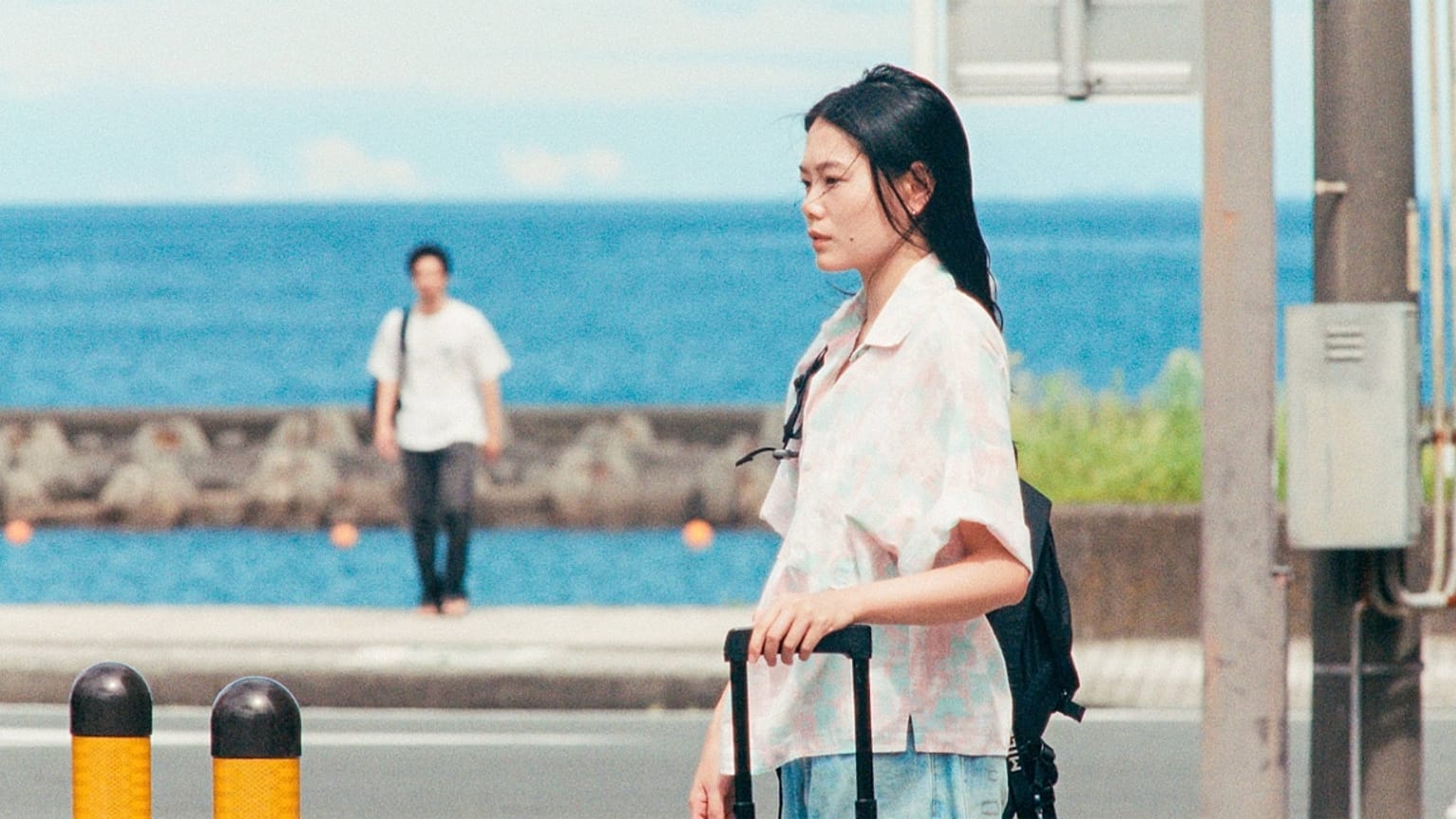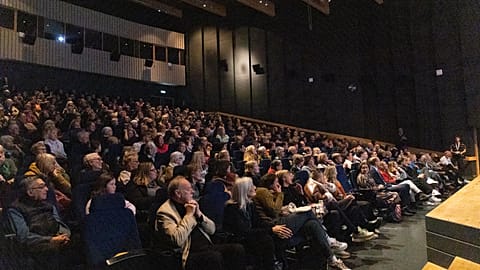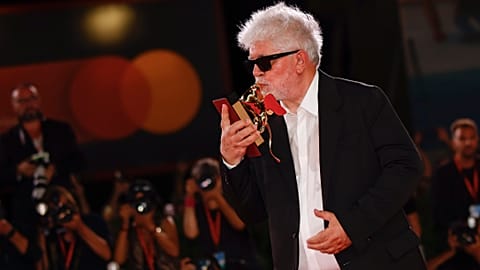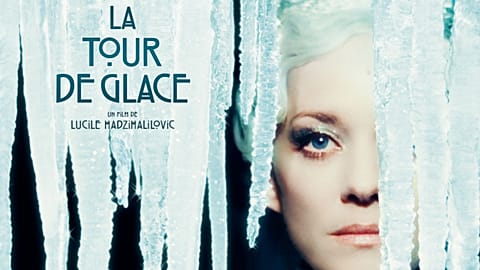In recent years, Iceland has made a name for itself as a prime location for film production, welcoming movie makers from around the world. Where better to learn about the industry than the country’s premier film event, the Reykjavík International Film Festival?
 ADVERTISEMENT
ADVERTISEMENT
“When I was a journalist, I got the opportunity to interview filmmakers. I went to the Berlinale and was so inspired – I saw how the atmosphere in the city changed,” says Hrönn Marinósdóttir. “I thought, deep down, we need to have something like this in Reykjavík.”
In 2004, Marinósdóttir’s vision became a reality, when she co-founded the Reykjavík International Film Festival (RIFF) – which she still directs today.
Euronews Culture headed to RIFF 2024 (which ran 26 September-10 October) to – naturally – see some great movies, but also sit down with festival organisers and filmmakers to get the inside track on Iceland’s unique cinema industry, and RIFF’s role within it.
RIFF in 2024
From small beginnings, initially focusing on Icelanders making films abroad, RIFF has grown to become not only Iceland’s most prominent film event, but an increasingly important stop on the European film circuit.
As well as drawing esteemed names to its team, including Head of Programming Frédéric Boyer – also artistic director of the Tribeca Festival and the Les Arcs European Film Festival – RIFF has become known for welcoming illustrious guests.
This year’s attendees included actress Nastassja Kinski, famed for Roman Polanski’s Tess (1979) and Wim Wenders’ 1984 neo-western Paris, Texas, the latter of which was screened at RIFF together with Paul Schrader’s Cat People (1982), and followed by a masterclass by Kinski; director Bong Joon-ho, of Parasite (2019) fame, who joined Icelandic audiences online for a discussion following the screening of his earlier films Mother (2009) and The Host (2006); and Greek filmmaker Athina Rachel Tsangari, co-producer of three films with Oscar-nominated, BAFTA and Golden Globe-winning director Yorgos Lanthimos, who brought three films to screen in Iceland, including her 2024 drama Harvest.
Beyond these big names, RIFF is known as a champion of pioneering independent cinema, with its main New Visions competition dedicated to first and second features. This year, French-Japanese co-production Super Happy Forever (2024) by Kohei Igarashi (first shown at the Venice Film Festival’s Giornate degli Autori) scooped the Golden Puffin, handed out by a jury comprising Ava Cahen, Elad Samorzik and Ingvar Sigurõsson.
As well as crowd favourites like the ever-popular drive-in cinema, RIFF this year featured filmic-gastronomic crossovers, such as a special screening of Alfonso Arau’s Like Water for Chocolate (1992) paired with a unique menu by vegetarian restaurant Sónó Matseljur and the cheese-centred documentary Shelf Life (Ian Cheney, 2024) accompanied by a cheese and wine tasting. Yum.
The role of RIFF on the Icelandic scene
Though the big visiting names might grab the headlines, RIFF also aims to be a meeting place between Icelandic cinema and the world – it’s with this in mind that its ‘Icelandic Panorama’ is dedicated to the best of new independent Icelandic cinema, and the festival’s Industry Days programme (covering topics as diverse as costumes, marketing, distribution and makeup) welcomes filmmakers from across the globe.
“We organise the Industry Days to introduce the international film industry to what’s happening in Iceland,” explains Marinósdóttir, also noting the importance of bringing filmmakers, actors and jury members from other festivals to RIFF. “We believe RIFF is very important in this ‘chain’ to make Iceland a ‘film country’ and to make Reykjavík a ‘film city’ and also to be an inspiration also for filmmakers who don't have the chance to travel to see the films.”
Local independent filmmaker Ólafur Ólafarson – who tells Euronews Culture how his “very first film, a one-minute short”, was shown at RIFF, and whose feature Aftergames screened there this year – has felt the benefit.
“I love RIFF. The energy and festivity of it are what draw me in, and they always have a great selection of both new and old films to celebrate…. I’ve seen some incredible new talent emerging this year and I have direct access to all these people through the festival and its events,” he enthuses.
“What I’m witnessing is truly exciting for the future of Icelandic filmmaking. It’s amazing how RIFF has grown into such a prominent festival, attracting impressive honorary guests and showcasing some of the best films of the year. I’m thrilled that they’re also giving space to tiny indie films like mine. While it’s still too early to tell how it will impact me or my film directly, I’m just grateful to be part of it,” he says.
But, it’s not only about filmmakers – it’s about local Icelandic audiences too.
“We are the new distributor in a way,” Boyer explains, “So the audience are waiting for us, festivals, to bring and to show what we think is the best or the most interesting.”
As with many other festivals, Marinósdóttir and Boyer emphasise the importance of bringing as many filmmakers as possible to RIFF for Q+As and masterclasses, as this is something that has been received very warmly by local audiences. The particularly special thing about RIFF, though, they believe, is its inclusivity and community feel.
A key element of this inclusivity is bringing in other art forms (for instance the photography exhibition on show at the main venue, Háskólabíó) and hosting screenings in unexpected places, that are either familiar or intriguing to audiences less inclined to visit the cinema – with swimming pools and caves just two of the unexpected festival locations. The ‘RIFF Around Town’ programme brought films into everyday spaces, including libraries and cafes on Reykjavík’s Laugavegur shopping street.
Although Reykjavík is home to around 60% of Iceland's population, it’s important to Marinósdóttir and Boyer that RIFF’s impact ripples beyond the capital.
“I'm sad to say that, in parts of the country, there are no cinemas,” Marinósdóttir laments. “But we work with the cinemas that are still there, we work with libraries and we also send films to teachers so they can use them in the classroom. We just want to spread to as many as possible the power of film.”
This prioritisation of inclusivity – and fun… who wouldn’t want to try watching a movie in a pool? – is palpable when attending RIFF.
“We are trying to stay not too professional,” Boyer laughs. Perhaps this is the key.
Iceland as an international filmmaking hub
RIFF’s development is indicative of Iceland’s growth as a filmmaking hub more broadly: drawing international movie makers to shoot their films among Iceland’s awe-inspiring scenery (and make use of the island’s state-of-the-art post-production facilities).
High-profile films like Star Wars: Rogue One, Prometheus, and The Secret Life of Walter Mitty have all opted to film in Iceland, attracted in part by the enticing 25% rebate available to filmmakers. This financial incentive has made the country a sought-after destination for major productions.
“We introduce the industry to the possibility of shooting here,” Marinósdóttir emphasises RIFF’s aim to grow the Icelandic filmmaking scene more broadly. “We show that there are also extraordinary Directors of Photography, sound designers, technicians.. And a big studio, of course, next to Reykjavík.”
This studio, RVK Studios – owned by film-maker Baltasar Kormákur, who is a highly acclaimed director, writer and producer on an international scale – is undoubtedly among the big draws.
The epic site, indeed situated a short drive from the centre of the capital – far quicker to get to than many studios, for instance Pinewood outside of London (a factor not to be overlooked when thinking about actors’ contract hours) – offers full production services for film, television, and photo shooting in Iceland. Among its most recent projects, RVK has served as a service provider for Star Trek Discovery, The Witcher and Luther: The Fallen Sun.
Walking around the gargantuan studio space, Kormákur shares how, as well as drawing international projects to Iceland, his aim was to “provide great conditions for Icelandic people in the film industry to work in”.
Montreal-based filmmaker Pascal Payant, whose new feature All Eyes On Me was shot entirely in Iceland, spoke to Euronews Culture about what drew him to the country – even though his small production “didn’t fit into the traditional film system with incentives”.
"The benefit of shooting in Iceland is the breathtaking 360-degree views. It looks grand, and the cost of filming there is minimal,” he explains. “You can’t go wrong with production value in such an environment.”
“For 25 years, I've had a ‘one-man show’ approach to filmmaking, handling almost every step myself. However, for this project, we were fortunate to receive support from the Iceland Film Fund,” he says. "Receiving help for post-production was incredible—it was a first for me.
Nurturing local talent
As well as RVK Studios, Euronews Culture headed out to an outdoor film shoot location in the Icelandic countryside to get a sneak peek of progress on upcoming feature The Fires.
As producer Grimar Jonsson explains, the story centres on Iceland's top volcanologist, who faces two simultaneous disasters at once: a volcanic eruption that threatens the safety of Reykjavík and a love affair – yes, we also can’t wait to see it. Particularly as the cast includes Danish actor Pilou Asbæk, of Game Of Thrones, Aquaman and Borgen fame.
There we meet director Ugla Hauksdóttir who – with credits including Amazon Studios series The Power and accolades such as becoming the first Icelandic female director to become a member of the Directors Guild of America – has returned home to make her first feature film.
“I was working on the [upcoming] Alien TV series, where there were around 800 people on the crew,” she says. “Here it’s much smaller, there’s maybe 40 people on set every day. But what’s remarkable about crews working in Iceland is their ambition.”
This begs the question – where does this ambition and drive stem from?
For Ólafarson, film education is a major factor.
“The Icelandic Film School is a fantastic gateway into the industry, a place to meet veterans and future professionals alike. I look back fondly on how helpful everyone was to us film students,” he reminisces on his own studies. “Asking permission felt more like a courtesy than a rule. If the police found us [putting up] lighting in a neighbourhood late at night, we’d just tell them we were filming a short for film school. They’d remind us to keep it down while gladly accepting a cup of coffee from our catering table!”
“The government's grant system, with conditions tied to foreign investments, and now with up to 35% reimbursement for films shot here, has turned Iceland into a hotspot for international productions. The industry is booming,” he says.
Nonetheless, it’s the next generation of pioneering filmmakers that enthuses him above all.
“What excites me the most is what I've seen at RIFF this year. A new generation of Icelandic filmmakers is rising. Some of the Icelandic short films absolutely blew my mind,” Ólafarson praises. “It feels like we're on the brink of a revolution, where the passion, the creativity and willingness to experiment is about to transform Icelandic cinema into something we've never seen before, and not just with the films that we make, but in how we make them.”
Challenges facing the Icelandic film industry
As some of the biggest issues facing RIFF are financial, so too are those facing the industry more broadly in Iceland.
“There’s a bit of frustration in the air at the moment in the film industry,” Marinósdóttir shares. “The film industry is going to face a lot of cuts. In the media they’re saying every day that the Icelandic Film Fund is going to be cut by 40%.”
Kormákur understands such frustrations, including anger on the part of some local filmmakers that funding help seems to be targeted towards bringing international business in. But, he believes, the picture is rather more complex than first appears – and rather more optimistic.
“The outcry has been about ‘Oh, you're spending the money on foreign productions and you're cutting down on Icelandic films,’ which is not the truth. The fact is 40% of this money goes to Icelandic productions,” he explains.
“We are producing both Icelandic and international stuff, like [the upcoming historical drama series] King and Conqueror is based on an Icelandic saga,” Kormákur expounds. “It is in English, but most of the people who worked on it were Icelanders. We produced it for CBS and the BBC.”
The studio head sees a certain counterproductivity to claims that international productions get more than their fair share, for instant recent assertions that Jodie Foster when filming True Detective: Night Country “was getting more money from her rebate than the whole budget for the film fund”.
“First of all, it has nothing to do with Jodie Foster. She's just an actress in the project. Secondly, the project brought tens of millions of dollars into the Icelandic system. If they wouldn't have got that rebate, they simply wouldn’t have shot it here,” he says. “So I think it’s a poor, shortsighted argument. We should remember that it’s about making the cake bigger, for everyone.”
Ólafarson sees the challenges of making films in Iceland and the country’s great potential as two sides of the same coin.
“The biggest challenge Icelandic filmmakers face is not financial or systematic,” he suggests. “There is so much we have yet to do, so much we have the potential to do. The hardest part is to navigate between the spheres of what Iceland has never done, and what no one has ever done.”
For the young filmmaker, the real gold is found in works “deeply rooted in Icelandic culture and heritage” – all the way “from the Icelandic sagas to Halldór Laxness's novels and the monumental cultural phenomenon of The Night Shift TV series”.
The key to their success? “These things are not trying to be anything other than what they authentically are,” he says.
“Making films in Iceland is a paradox, a contradiction driven by artistic will,” Ólafarson affirms. “We do it despite the fact that it is not inherently sustainable: because we love it, need it, and demand it. And somehow, the people of this country have made it work.”


























